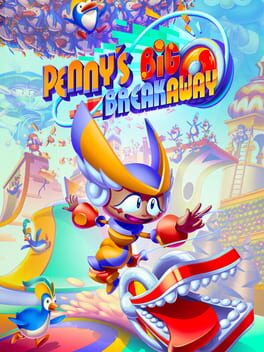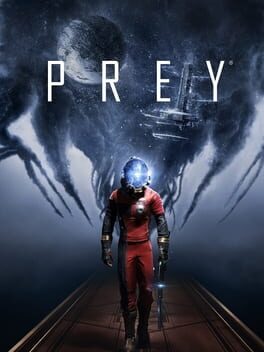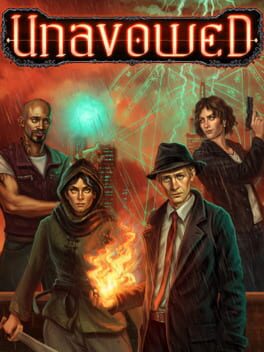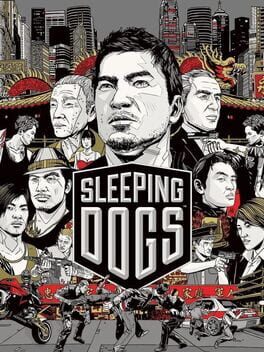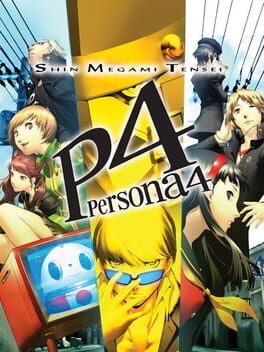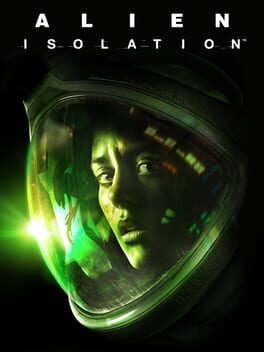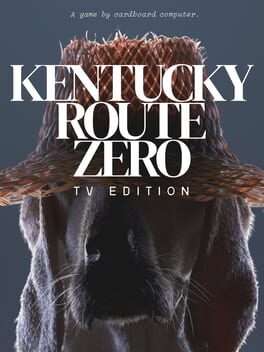dsarath
2020
A very good game that falls frustratingly short of greatness. Its immersive world, phenomenal performances and brilliant writing is sometimes let down by a lack of meaningful decision-making and repetitive combat, as well as a whole host of bugs. I’ve reached the end of Act 2 partly in awe of what it accomplishes and partly disappointed by what it does not.
1996
I remember getting the demo disc with the Official PlayStation Magazine back in 1997—I've never felt older than I have writing this sentence—and playing the opening stage so much that I remembered every lyric in 2023. Strangely, I never actually purchased the full game until today though. Its eccentric Japanese humour is irresistible; this is a game that literally includes a rap battle against an onion, a frog, a chicken and a cop so that you can take a poop. Applying the rhythm game format to rap flow is still such a fun idea too.
2019
2017
Played a couple of hours of this before deciding it’s very much not for me. It seems that the game’s unique selling point is its Dishonoured-esque freedom to choose your own path, but options are always limited and methods are extremely repetitive. There are at least a dozen too many mechanics here too; Alien had the right idea in keeping you in the game as much as possible, never alleviating the tension with scrolling through menus or crafting items.
By the turn of the 21st century, video games were no longer a niche subculture; they had become one of the world’s most popular storytelling mediums. And yet, video games were still dismissed by the cultural gatekeepers as a lesser form of entertainment—mindless button-mashing for basement-dwelling loners that, in the words of the great film critic Roger Ebert, “could never be art”. Gamers and those who made them wondered, ‘why couldn’t video games have their cake and eat it too?’. After all, movies held a similar space in the cultural zeitgeist; cinema was a medium that was both a billion-dollar entertainment industry and had the capacity to be considered high art. So if films could receive print space in the cultural pages of broadsheet newspapers, why must video games be siloed to online blogs and zines? And why couldn’t the storytelling, themes and visual languages of games be studied in the halls of academia just like movies are? In response to this, game creators strived to develop works that emulated the look and feel of cinema. “If movies are art,” they argued, “then why isn’t this?” Games slowly transitioned away from the pick-up-and-play experiences one would find in an arcade, and they more closely resembled interactive cinema. The thesis was simple: If Michael Mann’s crime saga 'Heat' can be written about as a great work of art then so, too, must a game like 'Grand Theft Auto V'. If the 'Indiana Jones' movies are worthy of study and analysis then surely the same must be said of the 'Uncharted' series. However, by borrowing cinema’s narrative conventions, video games have arguably never quite achieved their full potential. At least, they hadn’t until last week with the release of Nintendo’s 'The Legend Of Zelda: Tears Of The Kingdom'.
'Tears Of The Kingdom' is not cinematic. It is not an interactive movie. Instead, it represents everything that makes video gaming such a distinct art form in its own right. Like its precessor, 'Breath Of The Wild', it is a work that is astonishing in its lack of linearity. “Link, you must find me,” cries the eponymous Zelda in its opening sequence, establishing the goal that every player is expected to complete in order to conclude the game. From there, Link paraglides from the Sky Islands to Hyrule Kingdom below. Everything you do from here on out is entirely in your hands. There are four reports of Zelda sightings across Hyrule, but when you choose to investigate them, and in what order, is a matter of preference. You can immediately climb to the sweltering summit of Death Mountain or swim to the watery Zora’s Domain. Or, instead, you can explore any of the other hundreds of things to do in this enormous world—reuniting adorable forest creatures with their lost companions, solving puzzles inside shrines, photographing landscapes for display in stables, exploring the mysterious geoglyphs located across the map. No two experiences of 'Tears Of The Kingdom' will be the same. And nor should they be. Because what makes gaming such a unique medium is the ability to shape your experience based on how you choose to interact with the work. You should not simply be a voyeur when you play a game; you should be a participant, writing the story in real time. Many contemporary games have removed a lot of that agency from players in their quest to become more cinematic. Take 'The Last Of Us', for instance, one of the shining examples of gaming as an interactive movie. Although you have the ability to guide its main character Joel, a grieving father in a pandemic-riddled America tasked with escorting young Ellie who is immune to the virus, there is only a limited amount of improvisation afforded by its developer Naughty Dog. It is up to you to tackle enemies, navigate buildings and solve puzzles to get from point A to point B, but those two points have been carefully predetermined by the team at Naughty Dog. The fates of Joel and Ellie were sealed long before you boot the game; you are just a spectator with the illusion of control. That is rarely the case with 'Tears Of The Kingdom'.
The sense of non-linear freedom has, indeed, been a component of many open world games, including its predecessor 'Breath Of The Wild', which in many respects had perfected this style of video game storytelling. But where 'Tears Of The Kingdom' excels in comparison to all of these is that it not only lets you go wherever you want, whenever you want, it also lets you do this however you want. 'Tears Of The Kingdom' does this by gifting Link with four new powers: Ultrahand, which allows you to attach any item not tethered to the ground with another item; Fuse, giving Link the chance to combine any item with his bow, sword and shield; Ascend, letting you swim up through any solid surface above you; and finally Recall, the power to reverse any item’s direction of movement. Combined, they invite players to get creative about how they explore the world. Need to cross a wide wild river that will surely wash you away to your demise? Perhaps you could use Ultrahand to build a raft of your own design. Or you could employ your Fuse to merge arrows with ice to create frozen stepping stones. Maybe, instead, you could Ascend up a mountain and try gliding over. There appears to be hundreds of ways to tackle any obstacle, and Nintendo gives players unimaginable freedom to improvise a solution, no matter how unorthodox that idea might be. Want to cross that river by attaching a cannon to your shield and essentially creating a flying skateboard? “Sure thing,” the game says. “You do you”. The word “no” is simply not in its vocabulary, and the results of this are by turns thrilling and hilarious.
Much has already been made of the technical skill required to pull this off. “Hey Nintendo, quick question regarding Tears of the Kingdom,” tweeted ‘The Last Of Us’ and ‘Uncharted’ narrative director Josh Scherr, “how the fuck did you make this?”. It is a sentiment many developers have been sharing publicly and privately, and one shared by many of the 10 million people who purchased 'Tears Of The Kingdom' in its opening week. There simply has never been a game like this before; a pure, shining example of everything the form can be, and should be. Because What Nintendo’s developers have created with 'Tears Of The Kingdom' is only half of the game, the other half is what you bring to it with your own sensibilities and creativity. They have built a breathtakingly massive, wholly immersive and staggeringly beautiful playground filled with mystery, intrigue and conundrum, and it is your job to weave the legendary fables that will be etched into in its history from your own imagination.
'Tears Of The Kingdom' is not cinematic. It is not an interactive movie. Instead, it represents everything that makes video gaming such a distinct art form in its own right. Like its precessor, 'Breath Of The Wild', it is a work that is astonishing in its lack of linearity. “Link, you must find me,” cries the eponymous Zelda in its opening sequence, establishing the goal that every player is expected to complete in order to conclude the game. From there, Link paraglides from the Sky Islands to Hyrule Kingdom below. Everything you do from here on out is entirely in your hands. There are four reports of Zelda sightings across Hyrule, but when you choose to investigate them, and in what order, is a matter of preference. You can immediately climb to the sweltering summit of Death Mountain or swim to the watery Zora’s Domain. Or, instead, you can explore any of the other hundreds of things to do in this enormous world—reuniting adorable forest creatures with their lost companions, solving puzzles inside shrines, photographing landscapes for display in stables, exploring the mysterious geoglyphs located across the map. No two experiences of 'Tears Of The Kingdom' will be the same. And nor should they be. Because what makes gaming such a unique medium is the ability to shape your experience based on how you choose to interact with the work. You should not simply be a voyeur when you play a game; you should be a participant, writing the story in real time. Many contemporary games have removed a lot of that agency from players in their quest to become more cinematic. Take 'The Last Of Us', for instance, one of the shining examples of gaming as an interactive movie. Although you have the ability to guide its main character Joel, a grieving father in a pandemic-riddled America tasked with escorting young Ellie who is immune to the virus, there is only a limited amount of improvisation afforded by its developer Naughty Dog. It is up to you to tackle enemies, navigate buildings and solve puzzles to get from point A to point B, but those two points have been carefully predetermined by the team at Naughty Dog. The fates of Joel and Ellie were sealed long before you boot the game; you are just a spectator with the illusion of control. That is rarely the case with 'Tears Of The Kingdom'.
The sense of non-linear freedom has, indeed, been a component of many open world games, including its predecessor 'Breath Of The Wild', which in many respects had perfected this style of video game storytelling. But where 'Tears Of The Kingdom' excels in comparison to all of these is that it not only lets you go wherever you want, whenever you want, it also lets you do this however you want. 'Tears Of The Kingdom' does this by gifting Link with four new powers: Ultrahand, which allows you to attach any item not tethered to the ground with another item; Fuse, giving Link the chance to combine any item with his bow, sword and shield; Ascend, letting you swim up through any solid surface above you; and finally Recall, the power to reverse any item’s direction of movement. Combined, they invite players to get creative about how they explore the world. Need to cross a wide wild river that will surely wash you away to your demise? Perhaps you could use Ultrahand to build a raft of your own design. Or you could employ your Fuse to merge arrows with ice to create frozen stepping stones. Maybe, instead, you could Ascend up a mountain and try gliding over. There appears to be hundreds of ways to tackle any obstacle, and Nintendo gives players unimaginable freedom to improvise a solution, no matter how unorthodox that idea might be. Want to cross that river by attaching a cannon to your shield and essentially creating a flying skateboard? “Sure thing,” the game says. “You do you”. The word “no” is simply not in its vocabulary, and the results of this are by turns thrilling and hilarious.
Much has already been made of the technical skill required to pull this off. “Hey Nintendo, quick question regarding Tears of the Kingdom,” tweeted ‘The Last Of Us’ and ‘Uncharted’ narrative director Josh Scherr, “how the fuck did you make this?”. It is a sentiment many developers have been sharing publicly and privately, and one shared by many of the 10 million people who purchased 'Tears Of The Kingdom' in its opening week. There simply has never been a game like this before; a pure, shining example of everything the form can be, and should be. Because What Nintendo’s developers have created with 'Tears Of The Kingdom' is only half of the game, the other half is what you bring to it with your own sensibilities and creativity. They have built a breathtakingly massive, wholly immersive and staggeringly beautiful playground filled with mystery, intrigue and conundrum, and it is your job to weave the legendary fables that will be etched into in its history from your own imagination.
2018
Wadjet Eye's old-school point-and-click adventure draws inspiration from case-of-the-week TV such as The X Files or Buffy, taking place over seven stand-alone episodes in which its magic-powered heroes must solve supernatural crimes that span the breadth of New York City. The cases themselves are never particularly challenging, but the storytelling is compelling, funny and even occasionally moving—particularly as we witness the redemption arcs of each character. The ability to play the episodes in a different way depending on your choice of sidekicks is a novel idea for the genre too. However, the highlight of Unavowed is by far the third-act reveal—an ingenious and unexpected twist that provokes you to re-think everything about the story.
It is often creative restriction, not creative freedom, from which the most radical innovation is born. With Majora’s Mask, the development team, led by Eiji Aonuma, Shigeru Miyamoto and Yoshiaki Koizumi, were forced the complete the game under strict limitations. Nintendo had demanded a successor to Ocarina Of Time, a game four years in the making, within just one year, striking whilst the iron is hot, so to speak, after its critical and commercial success. To save time, the team were required to both work on the same engine which Ocarina was developed and create a game on a much smaller scale. Because there were only so many changes they were able to make, the developers endeavoured to stretch the creative limits of everything they could modify with Majora’s Mask. It enabled them to reinvent the typical Zelda format into a full-blown existential horror set against the impending apocalypse, packed with an array of surreal characters and scenarios. This same restriction is what inspired the team to create Majora’s Mask’s inventive, Groundhog Day-esque time-loop in which Link has only three days to save the world from disaster (approximately 54 minutes of game time) before it resets itself and the cycle begins again with only the items the player has collected carried over. These small but remarkable adjustments to the formula result in a singular experience that not only stands out from the rest of the series but 23 years on remains one of the most boundary-pushing examples of its artform.
2023
There’s a tone and atmosphere to the original Resident Evil 4 that’s so specific it’s like capturing lightning in a bottle. Try as they might to duplicate this in the remake—set your fears aside, Leon’s dialogue is as corny as ever—it’s never quite able to calibrate things to that fine line between macabre and cartoonish, hilarious and bleak. It’s still a blast, mind you. Like a derailed funfair ghost train it starts off eerie with Leon arriving in a medieval Spanish town in search of a missing girl, the latest in a string of mysterious disappearance, before it all descends into ever increasing levels of carnage and mayhem. It’s packed with edge-of-your-seat set pieces, extraordinary characters and plot twists aplenty.
2012
2008
Accept the truth and only then can you change it. Over the course of one year, Persona 4 sets each of its main characters on a trajectory of self-discovery, coming of age against the backdrop of the sleepy Japanese town of Inaba. Intertwined with their self-discovery is a story of good, old-fashioned Scooby Doo-esque discovery too, as this adolescent gang seek to learn the identity of Inaba’s serial killer who mysteriously murders women that appear on TV. Its aesthetic and gameplay make an enormous leap between this and Persona 5, which remains the better of the two, but the endearing characters and compelling plot are excellent nevertheless, and as always it’s bolstered by a lively score.
2014
A movie-to-game adaptation that truly understands what made Ridley Scott's original 1979 film so impactful. Like the movie's outstanding production and set design, the environments in Isolation function as a way of disguising the xenomorph. It is never clear where the alien might be at almost any point, forcing you to sneak and hide your way from one mission to the next, with only your sound detector as a guide. This means that whilst the game is conceptually very simple—it's essentially a long, sprawling, high-stakes game of cat and mouse—it is driven by an unrelenting tension throughout. Scott's political subtext has not been lost either with the Weyland-Yutani Corporation again symbolising rampant capitalism as it quite literally sacrifices the lives of its crew in pursuit of profit and power. The only disappointment: the game does outstay its welcome. This is a near-perfect 8 hour experience inexplicably stretched to 16 hours.
Kentucky Route Zero is a game about liminal spaces. Cardboard Computer's surrealist masterpiece finds its characters in search of things that may or may not exist. In the most literal sense, what they are looking for is the Zero, a hidden highway where our hero Conway is scheduled to make his final antique delivery to 5 Dogwood Drive. However, Conway and his cohorts' adventure is far more existential than the mere exploration for a mysterious address. Like the Zero, which exists somewhere between real and unreal, each of KRZ's heroes find themselves adrift between two states of being—life and death, employment and unemployment, companionship and loneliness. Their odyssey through a post-recession Kentucky, itself belonging to a space between the prosperity of the super-rich and the poverty of the working classes, finds them in search of something that will ail this liminality. What that is, however, even they don't seem to know. What is it that makes 5 Dogwood Drive so important? Maybe at this address they hope to locate the American Dream, or even the meaning of life, both of which are equally as elusive as the lost highway they are in pursuit of.
